15 Evidence-Based Health Benefits of Pomegranate
Throughout history, the pomegranate has been revered as a fruit enjoyed by royalty, with exceptional health, longevity and fertility properties.
The pomegranate has shown up in many famous portraits of royalty and the Virgin Mary, was known as “the fruit of the dead” in Ancient Greek Myths, and has been used in Chinese Medicine for thousands of years. (1)
Recently, they have been added it to supermarket shelves all across North America.
The Punica granatum produces a red fruit about the size of a navel orange.
The fruit in full maturation is a ruby red, with a small crown shaped stem.
One colloquial name is “Chinese Apple”, which makes sense because from a distance it can easily be confused.
Many studies have highlighted the numerous positive effects this fruit and its juice has on the body and mind.

The Easiest Way to Open
With pomegranates, getting to the goodness can be a real challenge—the pomegranate is a fruit that contains hundreds of edible seeds called arils.
The skin of the pomegranate is thick and inedible.
The easiest way to de-seed it is to cut it in half and immerse each half in a bowl of water.
(This saves your clothes from being squirted with the juice; beware it stains).
Upon cutting, you’ll notice that a thin white membrane separates hundreds of these tiny jewel-shaped arils.
As you roll the skin of the pomegranate, use your hand to separate the seeds from the white skin.
After you are finished, strain the water and you should have about 600 seeds.
Inside each ruby-aril is a hard seed.
These are edible (although some people choose not to eat them, they are fibrous and beneficial for digestion.)
Some sites recommend cutting it in half and hitting the skin with a wooden spoon, however, I have not found this to be effective and instead it has damaged some of the seeds and gotten juice all over.
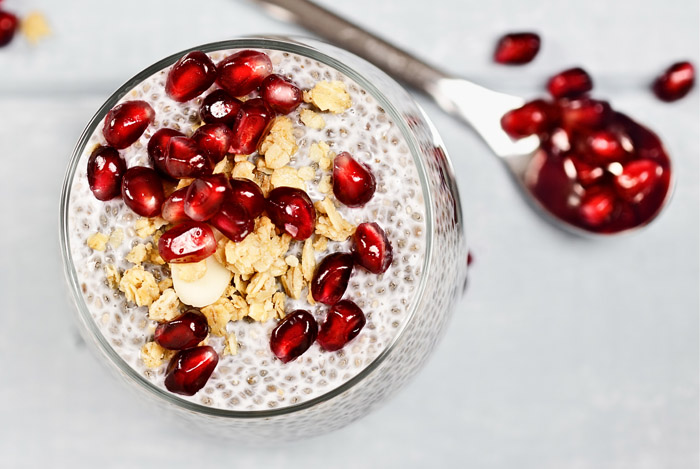
Health Benefits of Pomegranate
Packed with Nutrients
With the Internet at one’s fingertips, it’s easy to find nutrition facts on any and every fruit.
There are lists of reasons why each is the best for you.
However, the pomegranate is quite often considered a super food since it boasts more fiber and minerals than most fruits.
One whole pomegranate contains 48% of vitamin C in recommended daily intake (RDI), 45% of fiber (11g), and is very low in saturated fat and sodium.
It is important to be aware that it is high in sugar: 39 grams.
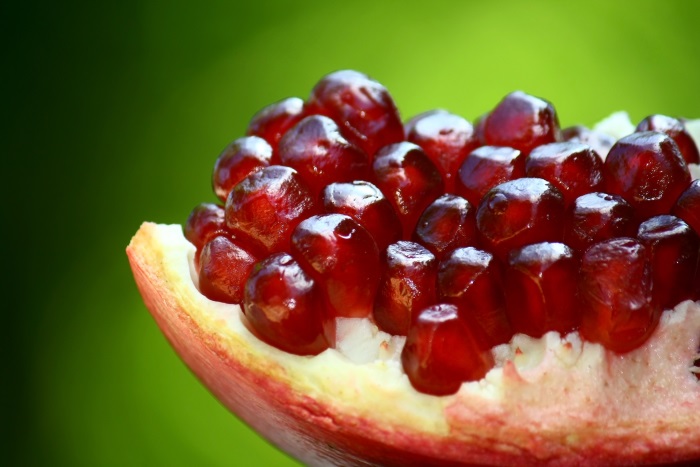
Contains Punicalagins and Punicic Acid
Punicalagins are extremely powerful antioxidants found in the juice and peel of a pomegranate.
Antioxidants play an important role in ridding the body of free radicals, molecules whose molecular nature has been damaged by pollutants in the body.
Antioxidants are believed to help protect the body from free-radical damage.
Pomegranate juice has more potency than leading antioxidant recognized drinks such as acai, blueberry, red wine, green tea and concord grape juice.
While the previously mentioned are also great sources for antioxidants, the pomegranate contains high levels of every type of antioxidant. (3, 4).
The peel of the fruit is used to make pomegranate extracts, supplements, and powders due to its impressive punicalagin content.
Punicic acidic, an omega-5 fatty-acid in the arils, is used to make pomegranate oil.
Among other things, the oil is antibacterial.
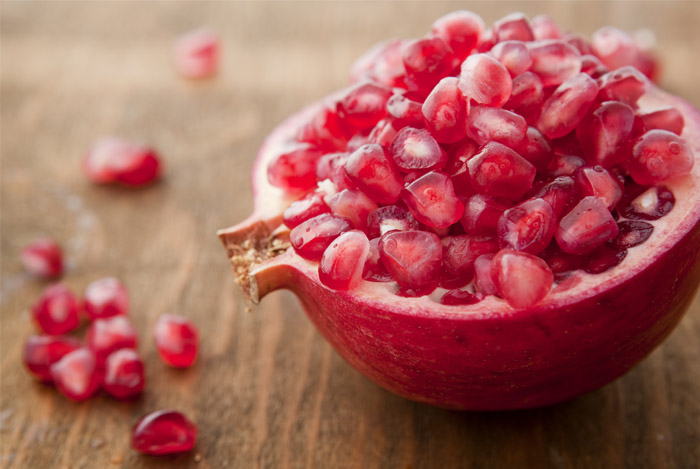
May Help Fight Cancer
Prostate Cancer
After lung cancer, prostate cancer is the second leading cause of male cancer deaths worldwide (6).
The primary process that leads to cancer begins with the production of free radicals in the body.
As highlighted previously, pomegranates are extremely rich in antioxidants that help to deplete free radicals in the body.
Laboratory studies have shown that pomegranate extract can slow down cancer cell reproduction, and even induce cell death in cancer cells (7).
A human study found that if men with prostate cancer drank a daily cup of pomegranate juice it potentially inhibited cancer growth and lowered the risk of death. (8).
Breast Cancer
Similar to prostate cancer, breast cancer is the most common type of cancer in women.
Laboratory studies have shown that pomegranate extract can help fight breast cancer cells.
Researchers at the University of California Riverside tested the effects of one percent and five percent concentrations of pomegranate juice to test tubes with breast cancer cells.
The results showed that both stopped the growth of the cancer cells, and the five percent even killed some of the cancer cells.
To recap: in both males and females, pomegranate extracts and juice showed evidence of helping to remove free radicals and growth of cancer cells.
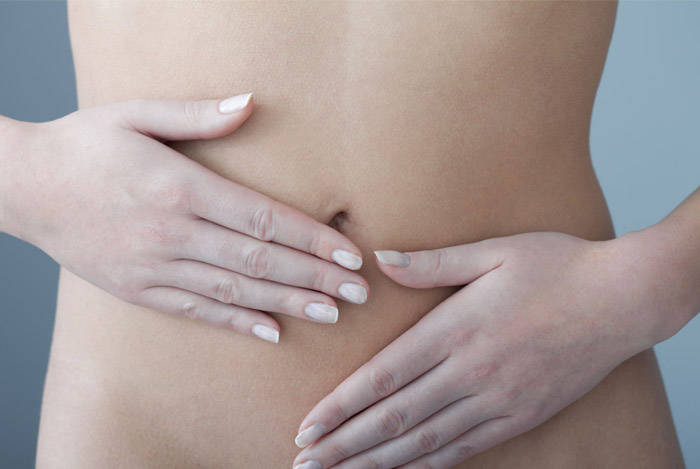
Aids In Digestion
Digestion is an important process that helps our body in assimilating and absorbing nutrients.
One way to help digestion is by making sure there is enough fiber in your diet.
The recommended amount of fiber for an adult is between 20-35 grams.
Pomegranates contain an impressive amount, 11g.
Soluble fiber absorbs water, softens stool, and promotes the growth of good bacteria that aids digestion.
Additionally, fiber makes you feel fuller longer, helps to clean intestines, which lessens the probability of contracting various infections and other gastrointestinal disorders.

May Lower Blood Pressure
Hypertension, also known as high blood pressure, is one of the leading causes of heart attacks and strokes.
Studies have shown that punicic acid in a half a glass of pomegranate juice helps people with high blood pressure to have a significant reduction and lower cholesterol (10).
According to the University of Maryland Medical Research Center, there is preliminary evidence that pomegranate juice taken on a daily basis may help lower the systolic blood pressure. (11)

May Help Fight Arthritis and Joint Pain
Osteoarthritis is the wearing down of cartilage in joints, causing pain and stiffness (12).
One of the plant compounds, flavanols, in pomegranate has anti-inflammatory effects that alleviate Arthritis, an inflammation in the joints.
Flavanols are believed to help block the production of the enzyme that induces arthritis.
In addition, free radicals are known to irritate inflammation in the body, which causes a delay in tissue repair and increases Arthritis.
The plant compounds in Pomegranates help flush out these toxins and help to repair damaged blood vessels.
Laboratory studies have shown that pomegranate extract can block enzymes that are known to damage joints in people with osteoarthritis (13).

May Lower Your Risk of Heart Disease
Heart disease is currently the world’s most common cause of early death.
Punicic acid, the main fatty acid in pomegranate, may help protect against several steps in the heart disease process.
It reduces bad cholesterol and increases good cholesterol, which decreases the risk of heart attack and stroke.
By promoting blood circulation, punicic acid aids in stopping blocked arteries from accumulating in the body (14).
A few studies in humans confirmed that arteries remained thin and flexible.
It has been stated that pomegranate juice may interact and have adverse effects on people already taking heart disease medications so it is advisable to cross check with your doctor if you are taking prescribed medications. (15)
By preventing the oxidation of cholesterol, the body produces plaque formation and the likelihood of getting coronary artery disease is lessened.
Pomegranate juice administration in mice for 14 weeks showed reduced LDL oxidation by more than 90%. (16).
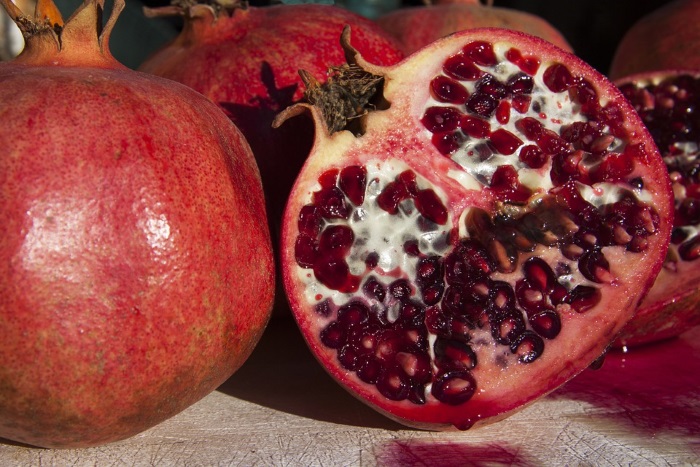
Help Fight Bacterial and Fungal Infections
Pomegranate has many anti-viral and anti-bacterial properties but the most noticed is its anti-plaque effect.
Research has shown that pomegranate extracts lower dental plaque by almost 84%.
Gargling pomegranate juice might be a more natural, and tasty, alternative to chemical ridden mouthwashes.
But that’s not all: dried pomegranate peel powder resists the yeast Candida albicans (18)
And antibacterial effects on E. coli has been shown (19).
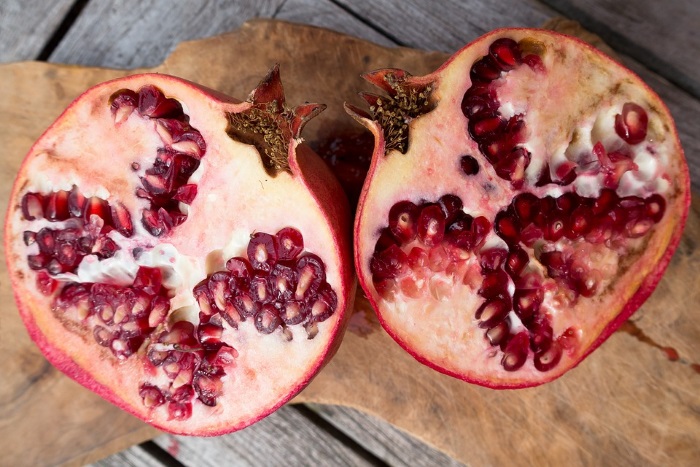
May Help With Aging
Yes, those antioxidants are at it again!
This time, the punicalagin comes in as the main player to work to reverse the damage the sun and pollution on the skin.
The antioxidants work to renew cells and prevent wrinkles.
In the same way, the juice helps with inflammation of joints and arthritis; the plant compounds rejuvenate skin and help with premature aging.
The high amount of vitamin c helps to keep skin looking younger, (and the immune system running) while the oil helps to strengthen the outer layers of the dermis and epidermis.

May Improve Exercise Performance
Many dietitians and personal trainers agree that a clean and natural diet, accompanied with exercise, is the key to success in maintaining a healthy body.
While fruit is often promoted in diets, it sometimes gets a bad rep as having too much sugar.
However, the University of Texas at Austin found that athletes that took supplements from pomegranate extract had improved in their isometric strength after three days of workouts.
In the same way pomegranate juice increased blood flow to help prevent the blocking of arteries, the increased circulation is beneficial for fitness.
In a study of 19 athletes running on a treadmill, 1 gram of pomegranate extract 30 minutes before exercise significantly enhanced blood flow.
In addition, the University of Edinburgh found that eating the fruit for one month repelled abdominal fat cells.
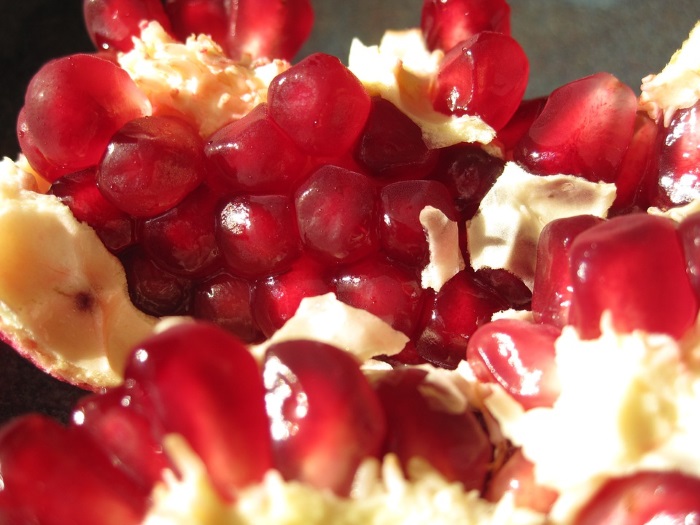
Improves Your Mood
Pomegranates contain plant compounds known as “phytochemicals”.
These compounds stimulate estrogen and serotonin receptors in the body that signal you to not feel depressed or sad: as a result, people tend to be more responsive and productive.
Serotonin dispels anxiety and fear, so next time your three o’clock break rolls around, try a cup of pomegranate seeds as a snack.
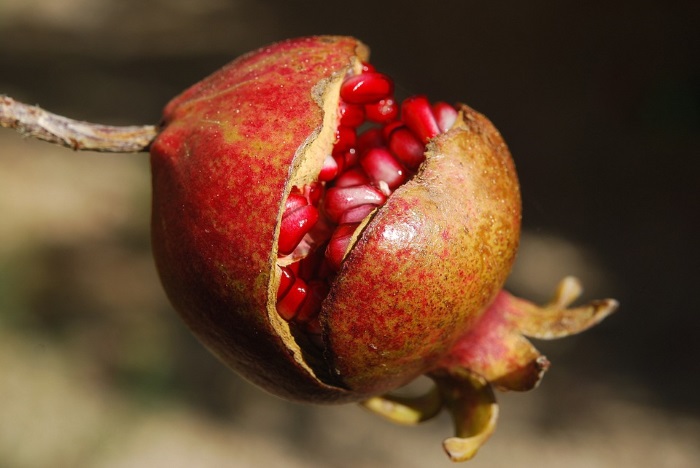
Anti-Inflammatory Effects
Pomegranate has potent anti-inflammatory properties, which are largely mediated by the antioxidant properties of the punicalagins.
Test tube studies have shown that it can reduce inflammatory activity in the digestive tract, as well as in breast cancer and colon cancer cells (24).
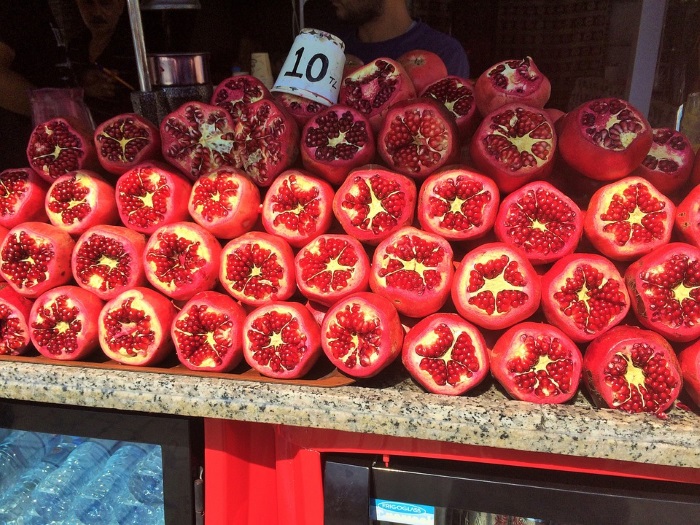
How To Make Juice
To make pomegranate juice, simply take the de-seeded arils and add one cup at a time to a blender.
Blend enough to rupture the seeds, and then push through a sieve.
Add agave, honey, or sugar to sweeten your juice.
Keep in mind pomegranates are high in fructose. It takes about 4 cups of arils (about 2 large pomegranates) to make 1 cup of juice.
Not sure what to do with the juiced arils? Add some brown sugar and use them as a gentle face exfoliator.
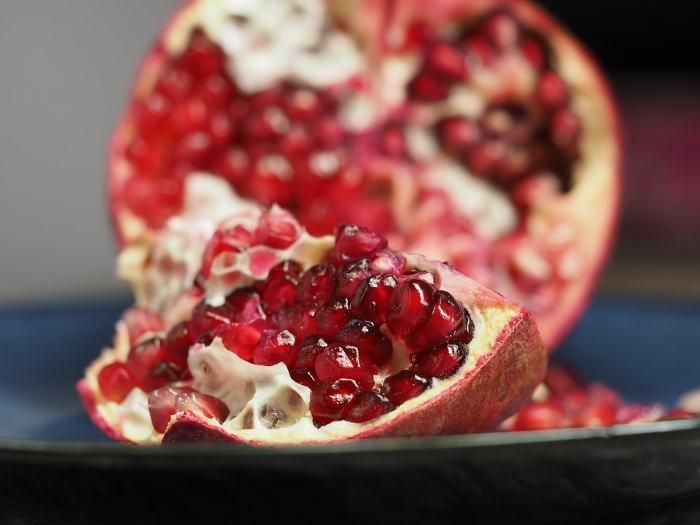
Easy Ways to Add Pomegranates to Your Diet
There are many recipes that include pomegranate arils.
Often used in Middle Eastern dishes, Indian curries, and Chinese stews, pomegranates are an easy addition to any meal: breakfast, lunch or dinner.
It’s tangy-acidic flavor pairs well with most meat, cheeses, and makes a great garnish for any plate. Here are some ideas for your menu:
Spinach and Arugula Salad with Goats cheese, red onions, pomegranate arils, and pumpkin seeds.
Pomegranate sorbet with fresh Mint.
Roasted Cornish Hen with Pomegranate Chutney
Pomegranate Juice Martini
Smoked Babaganoush with Pomegranate Garnish
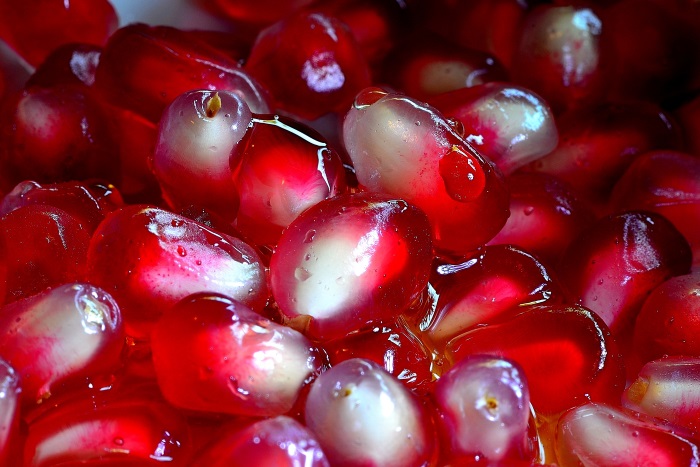
How to Pick and Store Your Pomegranates
Pomegranates are best when they are firm, without bruises, and their skin of a red color.
While they can be comparatively expensive, they can be stored in a fridge for up to two months, so you can take your time getting to them.
Conclusion
Much research is still being conducted to continue to discover the amazing effects this fruit has on the human body.
The wide-range of benefits place the pomegranate among the healthiest foods you can find.
They may help reduce the risk of all sorts of serious diseases, bacteria, and plaque.
They are proven to have beauty benefits such as anti-aging properties, as well as being a mood booster and a tasty treat; they are easy to add to your everyday diet.
FDA Compliance
The information on this website has not been evaluated by the Food & Drug Administration or any other medical body. We do not aim to diagnose, treat, cure or prevent any illness or disease. Information is shared for educational purposes only. You must consult your doctor before acting on any content on this website, especially if you are pregnant, nursing, taking medication, or have a medical condition.
HOW WOULD YOU RATE THIS ARTICLE?
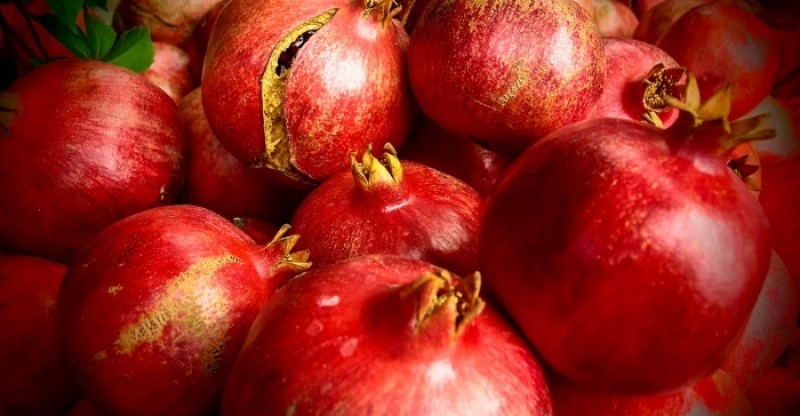


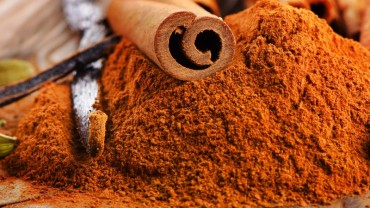

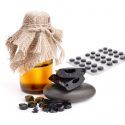

Great artice … thanks!!!
Maybe you know a fast way on how to get pomegrants seeds out???